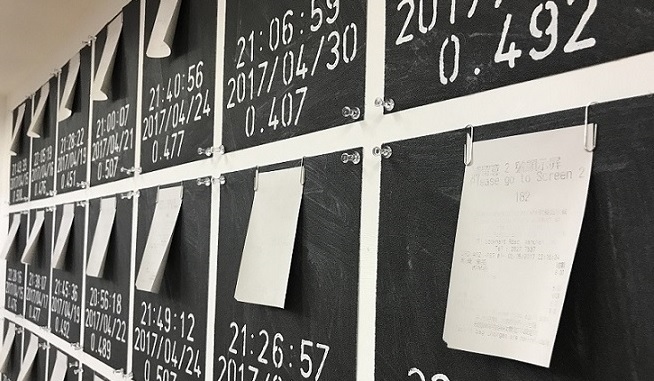藝評
How heavy is the night
鄭秀慧
at 4:47pm on 24th August 2018

Captions:
1.-5. Installation views of the exhibition
All photos by Vennes Cheng
原文以英文發表,題為〈看不見的沉重〉
‘Refugee’ and ‘refuge’, two words look so similarly yet mean paradoxically.
Refugee is a person who has been forced to leave their homeland; a person with no home and shelter. Refuge is a state of being protected and sheltered. I always misspell the two words. One letter different, they mean worlds apart. Our world is just full of distant paradoxes.
Artist Ma Yujiang moved from Beijing to Hong Kong in 2016, and his place is in Wan Chai district. However, the life in the city was not easy for the newcomer, the new place was not homey for him. Ma was stressed and depressed. Insomnia perturbed him; he found a refuge in 24-hour McDonald. He went there with a simple intention at the beginning - having late night supper. He, however, accidentally found one of the paradoxes in the prosperous Hong Kong – McRefugees. McRefugees refer to the homeless who take temporary refuge in 24-hour McDonald late at night. They often go there in the evening, try to use various tricks to avoid being expulsed, and stay until around 5 in the morning. Ma was stunned by incident. After that, he went to the same 24-hour McDonald on Hennessy Road every late night. He stayed there for few hours to collect the purchase receipts of the McRefugees, they are the evidence of the existence. Only with a receipt that a McRefugee can prove that he or she is a costumer and has right to stay. Ma’s late-night-McDonald-residency lasted for one year. He has collected hundreds of receipts.
Ma put each receipt on an abrasive paper with the date and time of purchase, and weight of it. Hundreds of receipts, they weight from 0.3 to 0.5 gram; most of the information on the thermal paper receipts has been faded in one year. Like the invisible and trivial life of these McRefugees. They often can only afford a small cup of coke or an apple pie: the cheapest items in the McDonald’s menu, receipts are therefore usually short. Hundreds of receipts were put in an art space of Foo Tak Building as an exhibition. They were sweeping three walls of the space and pervasive like columbaria. One would be instantly immersed with massiveness at the first split of second when entering into the space. The set up of the exhibition is an allegory to those lives (or life) of homeless. They have no refuge and not visible humanly. The McRefugees are invisible as not exist in the world. They are invisible to the others, or they do not want to be seen. Life to them is ponderous, rough and tough as an abrasive paper. One of Ma’s notes on what he saw on the stay from 6 to 7 July of 2016:
The lights probably make one hard to fall asleep, or perhaps to avoid the vision of the others. Anyway, he (or she) fortressed himself with cardboard paper
(原文: 應該在光線下難以入睡吧,也或許是怕人看到。總之,他(或許是她)把一塊硬紙板立在桌子上)
Ma asserted his stayed in McDonald and the receipts collecting – the happenings – are the art. The exhibition was a record of the art itself. Most of the media coverage about the exhibition focuses on the social implications; however, I believe Ma instigated the project with personal sentiment. He mentioned in a talk that he went to the 24-hour McDonald for late night supper, then realised there were people in the city as lonely and insecure like him. The realisation of the existence of McRefugees was remedial to him, he was not the only who feels estranged in the city. ‘How heavy is the night’ is more a statement to Ma himself as settling in a new place. It was not his intention to social issues or problems, not even aim to solve them. He had insomnia when first arrived here in Hong Kong. Night for the McRefugees is heavy, yet insomnia from insecurity in a new place is another sort of nocturnal heaviness. As an exhibition’s audiences or observers, we often tend to find refuge for our own feelings after viewing an exhibition: there must be meanings or ways to interpret. Indefinite apprehension seems to be menacing.
Art is undoubtedly reflective and fabricates appropriations. Ma’s exhibition ‘How heavy is the night’ reflects a social issue of McRefugee or even homeless problem on a larger scale. However, the artist’s person sentiment on life should not be deserted; the nocturnal heaviness is both from tough life of refugees in McDonald and the artist’s unsettled loneliness in the city. The fragility of life is precisely where the heaviness came from, it can be social or personal. As another scene in McDonald witnessed by Ma:
He sat solemnly and unpacked the packing of hamburger with greatest respect. Having the packing paper as placemat, he then started to eat seriously. The vegetable was accidently dropped out of the hamburger, he put them back cautiously. Then another dropout, and he put them back again. One of his hands was holding the hamburger, another hand was repeatedly putting the vegetable back to the burger.
Today is Mid-autumn Festival
(原文:他正襟危坐,認真地撕開漢堡盒的四個角,用紙墊著,認真地吃。蔬菜不小心掉到了紙盒上,他就認真地倒入漢堡裏。又有上碎葉子掉出來了,他就再倒進去。一隻手把漢堡打開,一隻手倒,反覆了幾個回合。今夜是中秋節。)
One finds refuge for one’s own sentiment in solemn ritual, despite the ephemeral.
Link for further info:
How Heavy is the Night: Ma Yujiang Solo Exhibition 馬玉江個展「夜未央」
